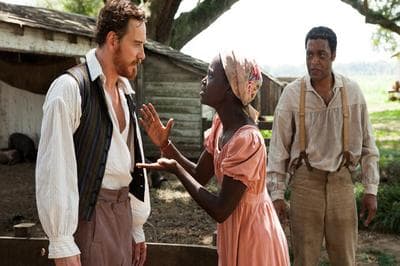Advertisement
Slavery In American Film
From “Gone With the Wind” to “Django Unchained” to “Twelve Years a Slave,” we’ll look at the evolving depiction of slavery in American film.

American slavery has had all kinds of treatment by Hollywood. Mammy and Scarlett in the "Gone With the Wind." Whipping and slave ships in "Roots." Swagger and revenge in "Django Unchained." Now comes a powerful, brutal, game-changing depiction from Fox Searchlight pictures and British filmmaker Steve McQueen. "12 Years a Slave" tells the true story of a free black American snatched and sold into slavery in 1841, and the decade and more he was under the lash. It is shattering. And, its director says, long overdue. Up next On Point: "12 Years a Slave," and slavery in American film.
-- Tom Ashbrook
Guests
Wesley Morris, sports and pop culture columnist at Grantland.com, winner of the 2012 Pulitzer Prize for criticism. (@Wesley_Morris)
Brenda Stevenson, professor of history at the University of California, Los Angeles, author of "The Contested Murder of Latasha Harlins: Justice, Gender and the Origins of the L.A. Riots" and "Life in Black And White: Family and Community In the Slave South."
From Tom's Reading List
The New Yorker: Fighting to Survive -- "'12 Years a Slave' is easily the greatest feature film ever made about American slavery. It shows up the plantation scenes of 'Gone with the Wind' for the sentimental kitsch that they are, and, intentionally or not, it’s an artist’s rebuke to Quentin Tarantino’s high-pitched, luridly extravagant 'Django Unchained.'"
UCLA Today: Brenda Stevenson On The Importance Of the New Film '12 Years A Slave' — " Patsey has gone to borrow some soap from another concubine on a neighboring plantation because her mistress, Mrs. Epps, would not give her soap to clean herself. All she wanted was to be clean, and for that, this young woman, who could pick more cotton than any of Epps’ male slaves was stripped naked, tied down and whipped to within an inch of her life. I really hoped that the beating would end in her death. I cried because it did not, because she had to continue to bear the unbearable, and because I knew that this scene had been acted out countless times during the era of slavery."
Advertisement
BBC News: Slavery on Film: What Is Hollywood's Problem? — "With '12 Years a Slave' about to arrive in US cinemas some are asking if it will redress the balance and finally bring audiences a more accurate representation of slavery.Variety’s chief film critic Scott Foundas admires the picture and thinks it will at least give audiences a hefty dose of reality. 'I think '12 Years a Slave' is unique in terms of motion pictures in trying to have this very plausible realism,' he says. 'In terms of this kind of brutal realism it’s pretty much unparalleled in the history of American movies.'"
Watch A Trailer From '12 Years A Slave'
This program aired on October 24, 2013.
